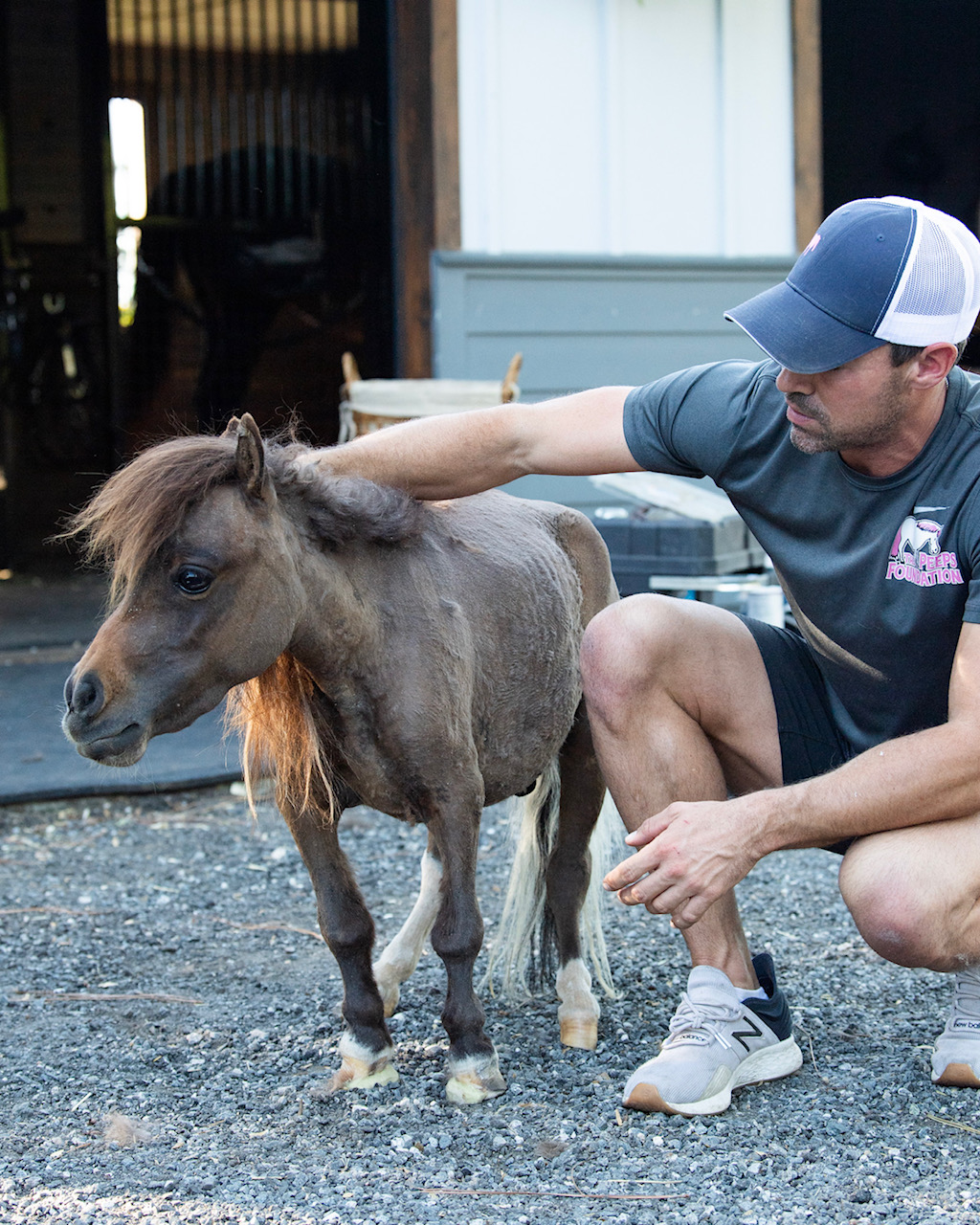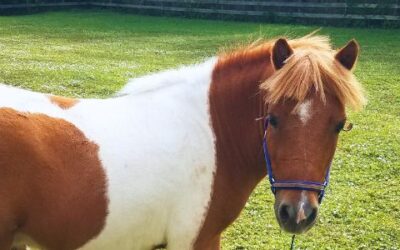
The Peeps Foundation Offers Hope and Practical Help for Tiny Equines in Need
by
Cynthia McFarland
All Photos Courtesy of Josh Dolan
A pinto miniature horse ambles around the corner of the barn, eyes bright, anticipating a treat.
Dozing in front of a large fan, a mini donkey flicks his ears in the cooling breeze.
There on the wash rack, next to a stately warmblood in cross ties, a trio of pint-sized horses are being bathed.
Everywhere you look, it’s a haven for tiny equines.
Upon closer inspection, it’s apparent these aren’t typical miniature horses. Some walk unevenly, many have prominent underbites. Legs are shorter and stubbier than normal. The Peeps Foundation specializes in the rescue, rehabilitation and care of dwarf minis.
What started just over a decade as a single rescue mission has blossomed into a full-blown sanctuary. It’s where Josh Dolan calls home and he wouldn’t have it any other way.
“I always wanted a mini and before we even bought that farm, my mom and I went to an auction and bought about 10 of them. Eventually, we had about 20 minis there.”
Dwarfism problems
Careful breeding for generations passes on the genetics and characteristics of the miniature breeds we appreciate today.
Unfortunately, breeding to make animals smaller and smaller can sometimes lead to dwarfism, which can put animals at risk of serious health problems.
When dwarfism is disproportional, there isn’t symmetry between all the body parts. When only some parts of the body are much smaller, this can cause significant problems, such as when the animal’s mouth is undersized, but the teeth are not. Legs can be deformed and much shorter than the typical mini, the hooves misshapen and more “clubby.”
Dwarfism is hereditary, but the mutation is recessive. Thanks to genetic testing, responsible Miniature Horse breeders today can typically avoid passing on these undesirable genes by not breeding two carriers of the dwarf mutation to each other.
“Responsible breeders very rarely produce dwarfs. Their stock is tested,” says Josh.
To his dismay, Josh discovered there’s a market for dwarf minis. He’s seen one sell for $20,000 at an exotic animal auction.
Sadly, some backyard breeders intentionally breed for dwarfism because these extra tiny animals often bring higher prices from buyers unaware of the health issues that typically accompany dwarfism.
Addressing those health problems is where The Peeps Foundation steps in. So how did a horse crazy kid from South Carolina end up on a mission save dwarf minis?
Unfortunately, with any animal that is consistently bred to be small, dwarfism can sometimes occur. This can result in undesirable features, such as a bulging forehead and extremely dished face, underbite, and stubby legs with club feet or other deformities. In a dwarf mini, the adult looks disproportionate with an oversized head and body for its small height. Buying only from reputable breeders is the best way to avoid dwarfism.
Horse crazy from the start
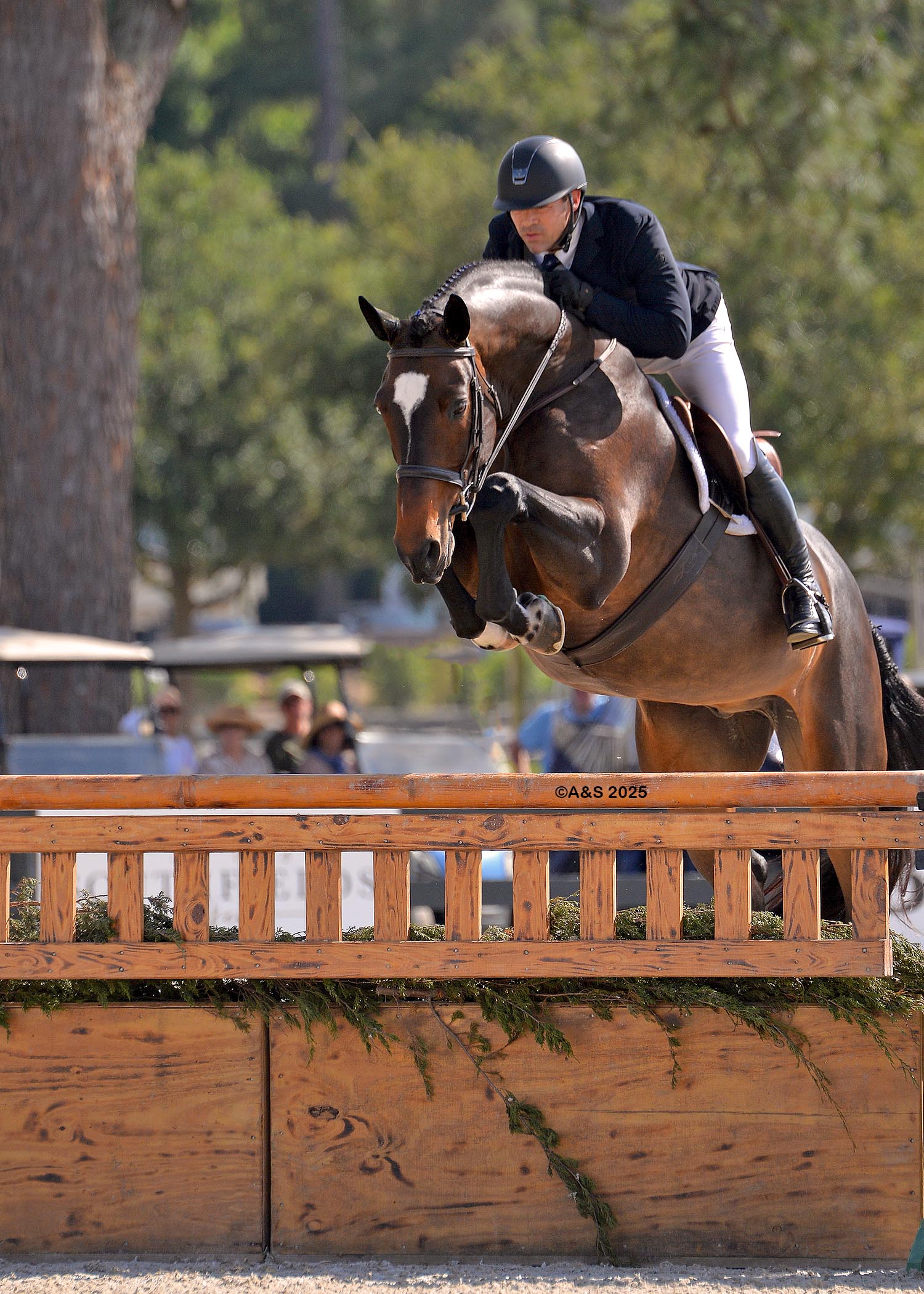
Born and raised in Hilton Head, South Carolina, Josh found horses early on.
“Hilton Head was a great place to grow up. Where we lived there was a stable at our back gate. I was entranced with horses from a young age,” recalls Josh, who was taking lessons by age 6.
“I was very fortunate that it was a hunter/jumper type barn. I started showing within a couple years and my parents were very supportive,” says Josh, who quickly moved up from short stirrup to the pony hunter divisions, going on to win numerous championships.
Like most kids, Josh had multiple interests, so when he hit his teens, he pursued tennis. Riding took a back seat for a few years, but at 17, his love for horses drew him back into competitive riding and he’s never left.
Josh’s success as a junior rider was no fluke. After returning to the sport, he focused on developing and showing his own horses–both hunters and jumpers–for several years before turning pro.
Today, his focus is totally on hunters. He’s made a name for himself as a competitor who brings out the best in his mounts and his success in the show ring keeps his barn stocked with client horses.
Enter minis
“I always wanted a mini and before we even bought that farm, my mom and I went to an auction and bought about 10 of them. Eventually, we had about 20 minis there,” says Josh.
“If they aren’t coming to us, we try to help these owners with their professional services and work with their vets, podiatrists and farriers, teaching them about hoof angles, regular maintenance, and the gluing of extensions.”
First rescue
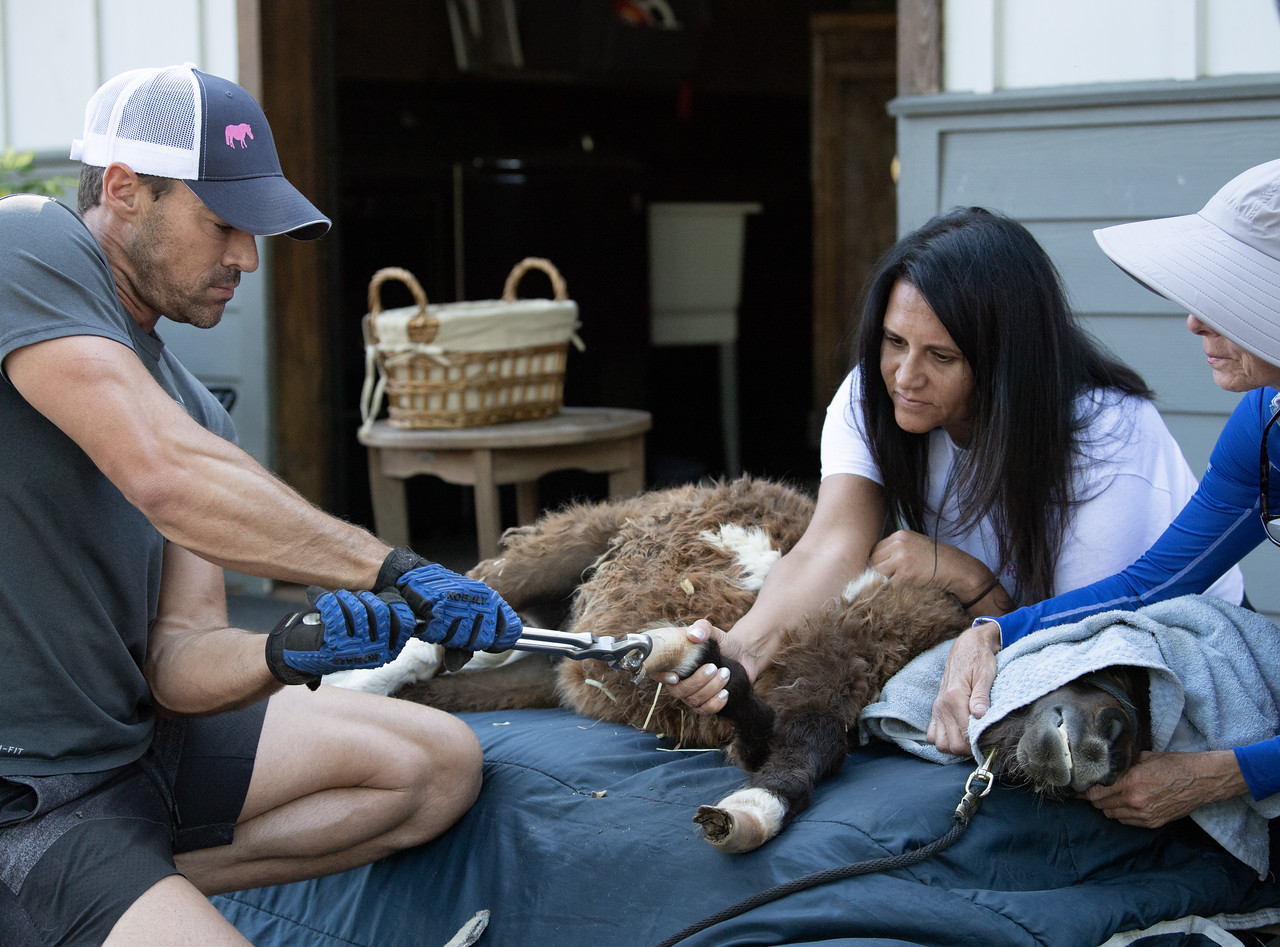
While in Lexington for a show in June 2014, he was headed to lunch when he drove past a field filled with miniature horses. Being familiar with minis, Josh realized most of these were dwarfs. It only took one glance to realize these animals, including young foals, were in bad shape. Many were emaciated, a few were already dead.
“They were horribly neglected,” says Josh, who after stopping and investigating the scene called local police and animal control but the property owner couldn’t be located.
Agonized over the situation, Josh returned the next day and found one weak foal had already died. Desperate to help those still alive, he left a note on the gate, even though it didn’t look like anyone lived there. He got a phone call later that day and made arrangements to purchase over 40 of the minis.
One of the rescued dwarf foals was only weeks old and so small, she earned the name Peeps, after the popular Easter marshmallow treats. The tiny filly was seriously ill and only survived due to dedicated care and months of antibiotics.
“When that first rescue happened, it wasn’t intended to become what it is now. It was just about being humanitarian. Animals were in need, and I was in the right place at the right time,” reflects Josh.
The rescued minis were nursed back to health at the show barn in Lexington and most were rehomed. When it was time to head south to Wellington for the season, Peeps and a handful of other permanent mini residents came along.
Determined to continue helping minis in need, The Peeps Foundation was launched and became a recognized 501(c)(3) non-profit organization in 2016.
“When this nonprofit developed, there were two chapters; one for rehab and one for rescue and rehoming,” says Josh, adding that the organization has rehomed over 1,000 minis since 2016.
On a larger leased property in Kentucky, it was easier to rescue more minis, but with The Peeps Foundation’s permanent location on smaller acreage in Ocala, Florida, the focus is more on rehabilitation.
Sanctuary and rehab
Flex Farm, as Josh named his operation, is now home to The Peeps Foundation, his show barn, and a host of animals.
Among the full-sized horse population, there are eight show horses, all warmbloods, owned by clients, plus a handful of Josh’s retirees. In the miniature equine category, there are at least 65, including six mini donkeys and a mini mule, but Josh laughs that he never adds up the numbers.
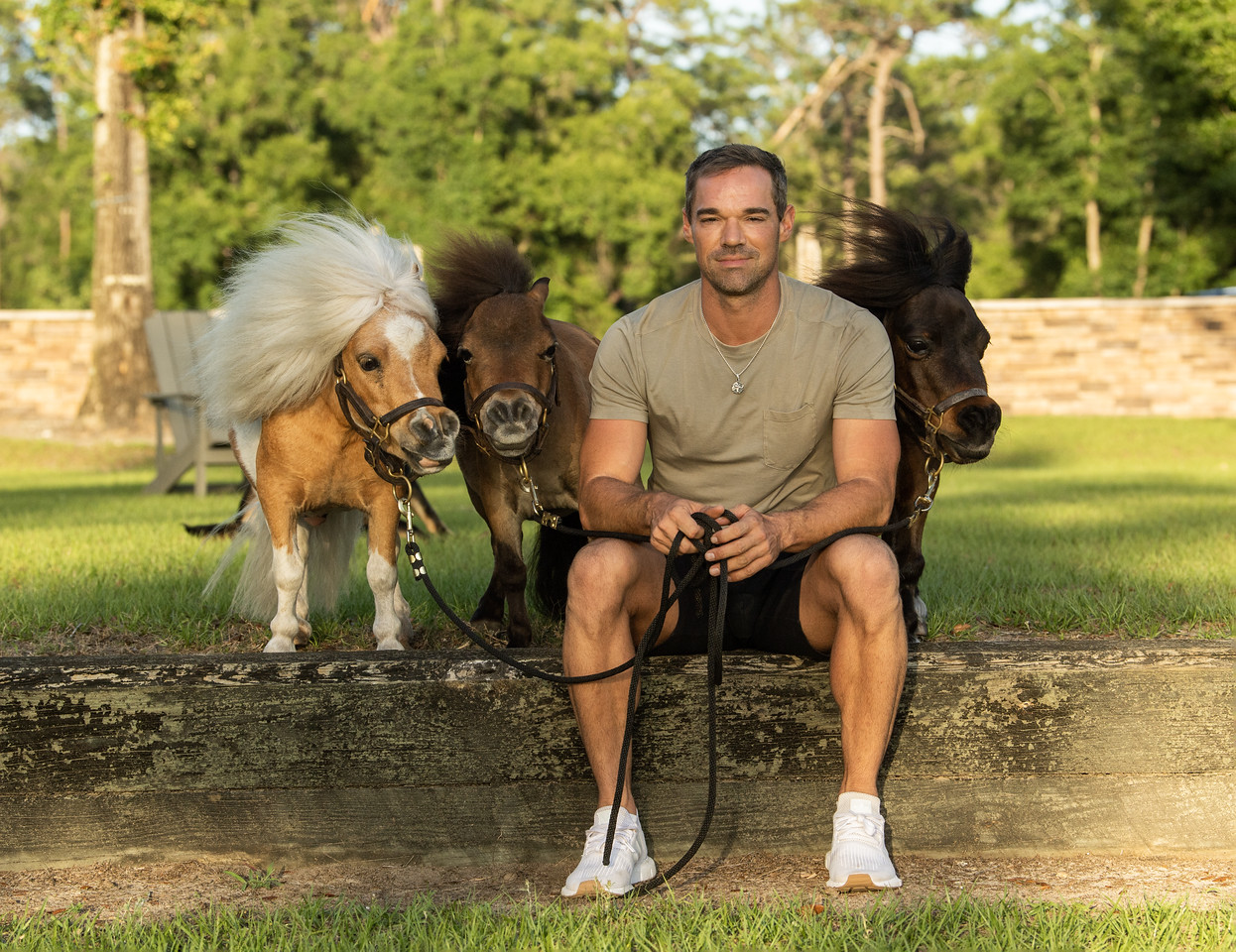
A genuine animal lover, Josh has opened his heart—and his farm—to a variety of critters, including kangaroos, llamas, African pygmy goats, a lemur, an African tortoise and more. In one paddock, there’s even an ostrich found on Facebook Marketplace. That’s not counting the “normal” farm animals, including dogs and cats. It’s impossible for Josh to turn away when an animal is in need.
In between his training and showing commitments, Josh stays busy with the minis. When he rescues “regular” minis, it’s now easy to place them.
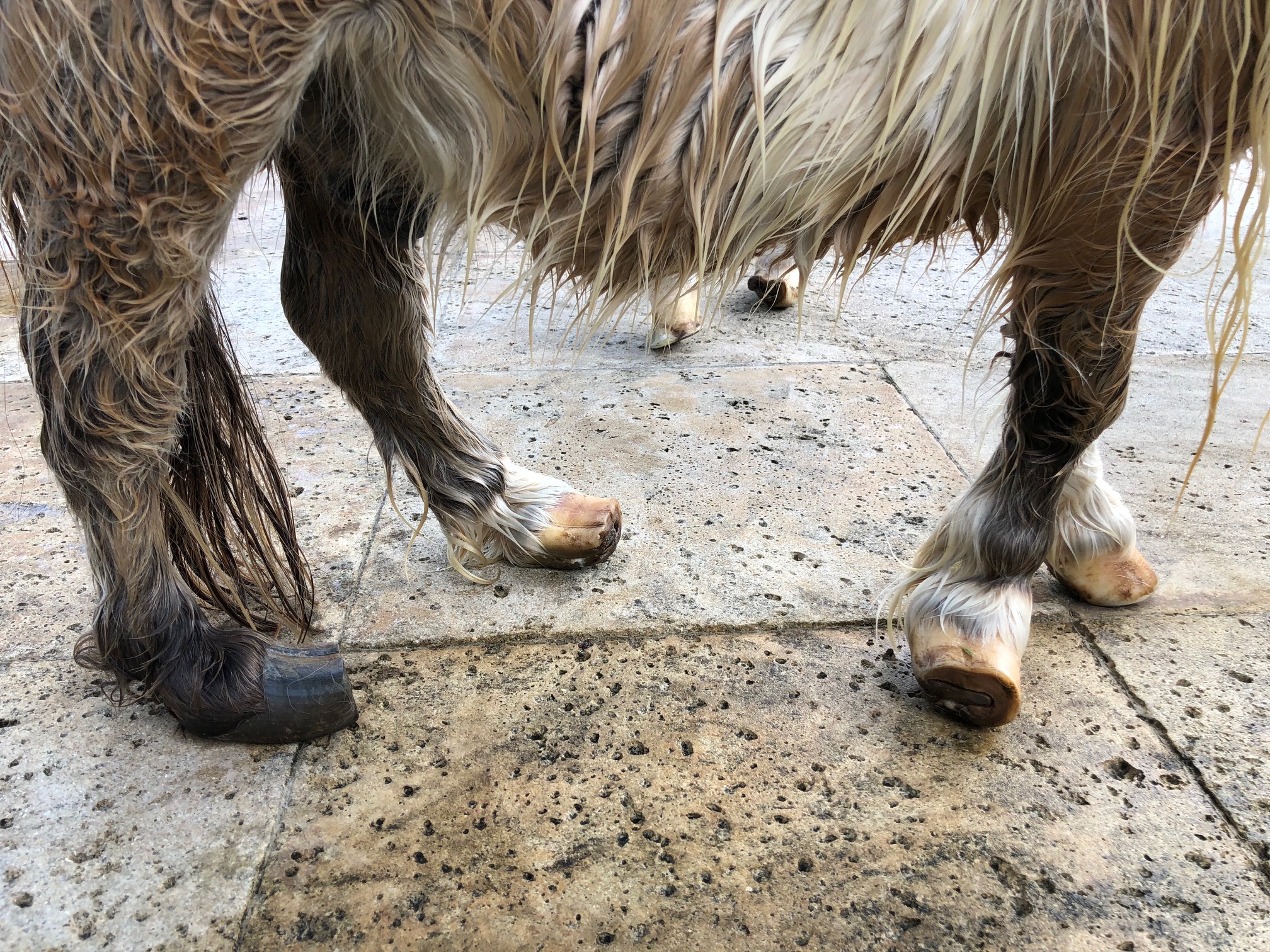
“Because we’re so connected in the hunter/jumper world, almost every mini is adopted into those homes, which is great. The next 10 minis we rescue we already know who they’ll go to,” he notes.
However, numerous minis just need expert care–not rescue. Over the past decade, The Peeps Foundation has become known for rehab work.
Miniature horses come to the Ocala farm from around the country. Many need to be “fixed” by receiving proper hoof care and veterinary care so they can get on the right track and then go home to owners who will continue to maintain them. Some are rescue cases needing both rehab and a safe home.
“Feet and teeth are the top two biggest health issues with dwarfs. They also have very slack tendons,” says Josh, who has worked with top farriers and veterinarians to learn how to address the hoof and dental problems of dwarf minis.
Corrective shoeing is an essential part of helping these minis become comfortable and more mobile. Videos on The Peeps Foundation Facebook page give a glimpse of the dramatic turnarounds in some of these cases.
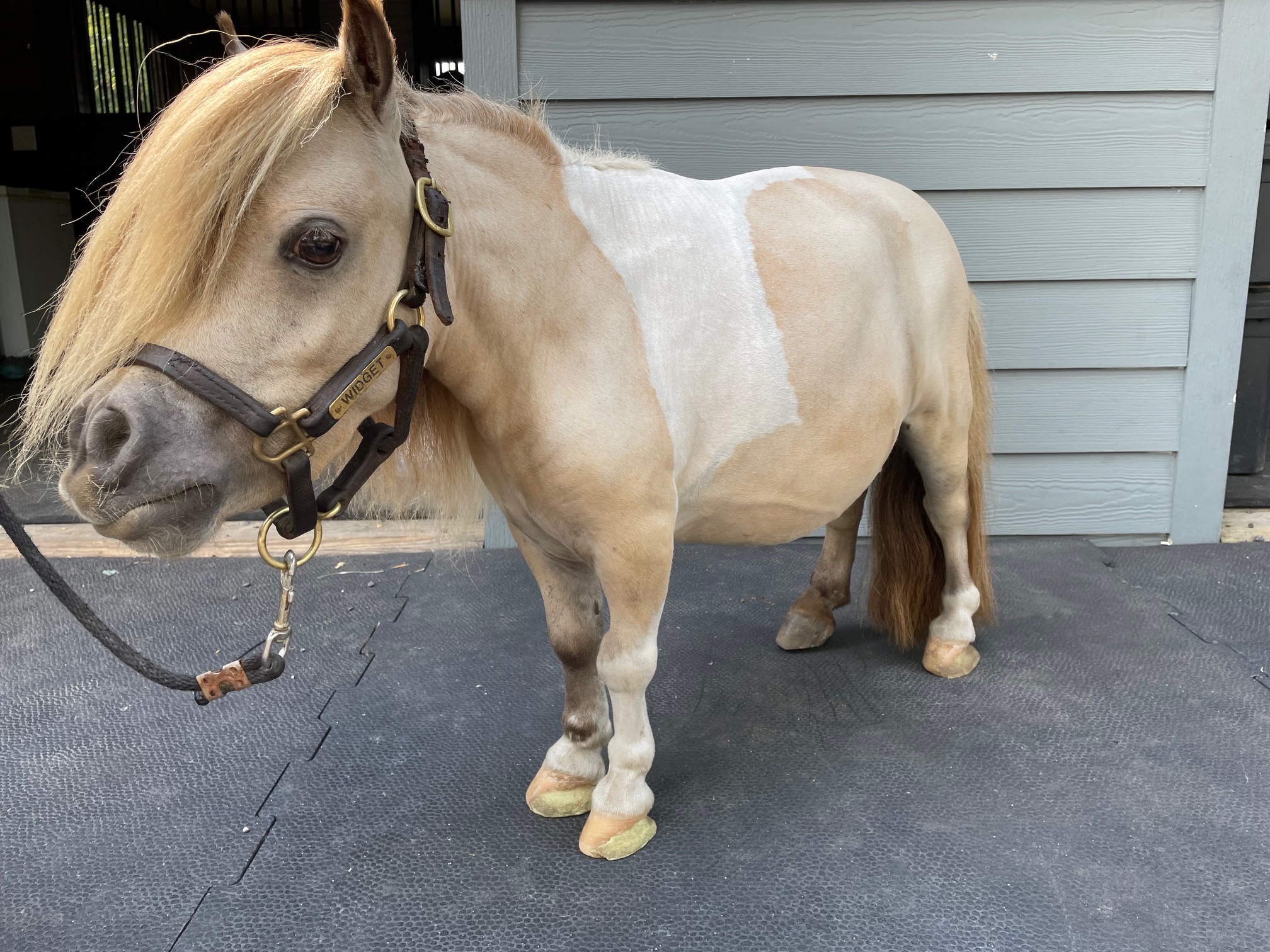
Ideally, the feet should be trimmed properly and maintained regularly, but this crucial care is often neglected, which is where The Peeps Foundation comes in.
Josh has had great success with gluing polyurethane shoes to the front of the hoof. Because of weak ligaments and tendon laxity, many dwarfs need hoof extensions that offer extra more support.
Josh routinely flies to farms in other states to help people with their dwarf minis and regularly travels to one barn in St. Louis.
“If they aren’t coming to us, we try to help these owners with their professional services and work with their vets, podiatrists and farriers, teaching them about hoof angles, regular maintenance, and the gluing of extensions,” says Josh.
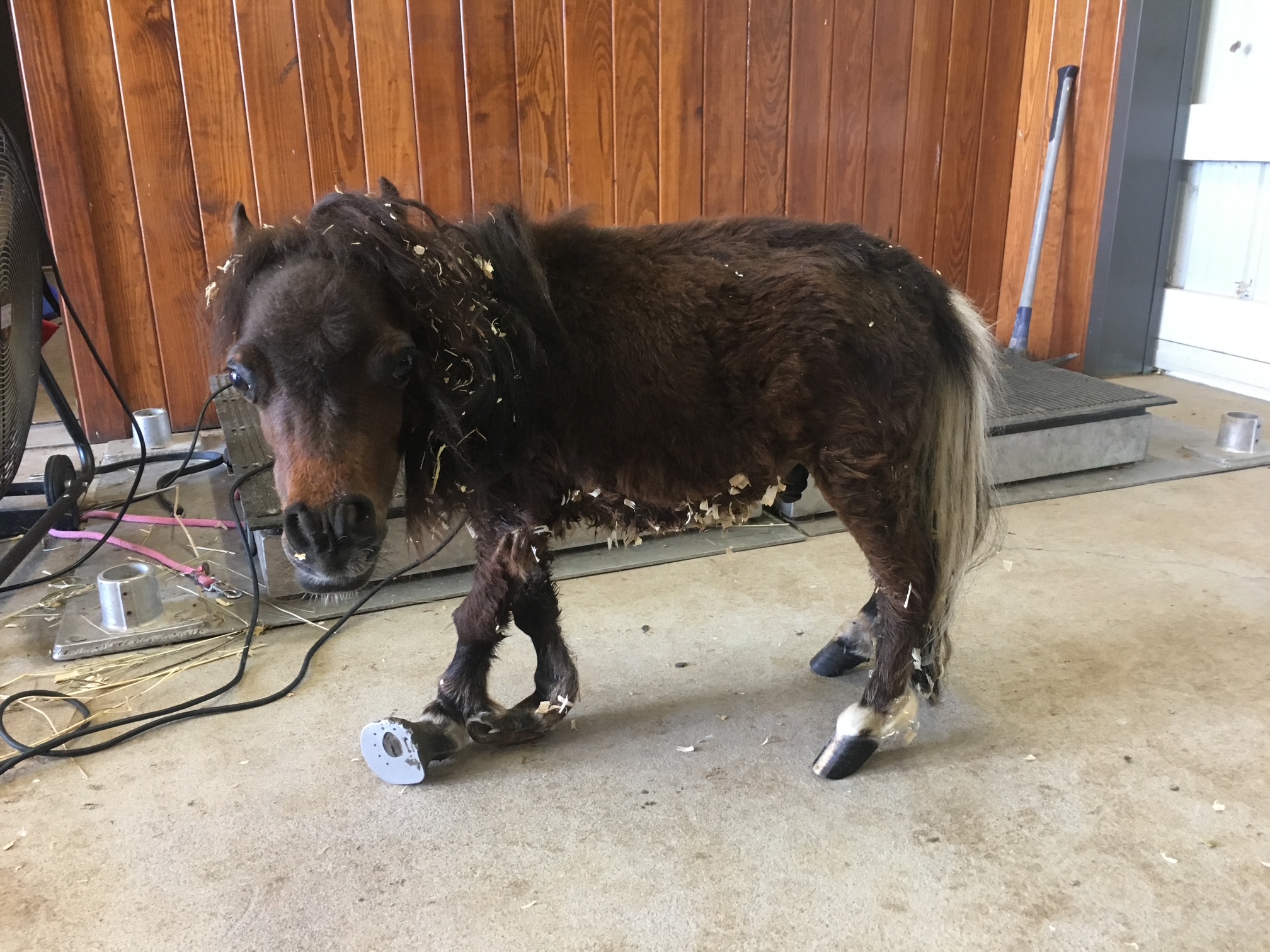
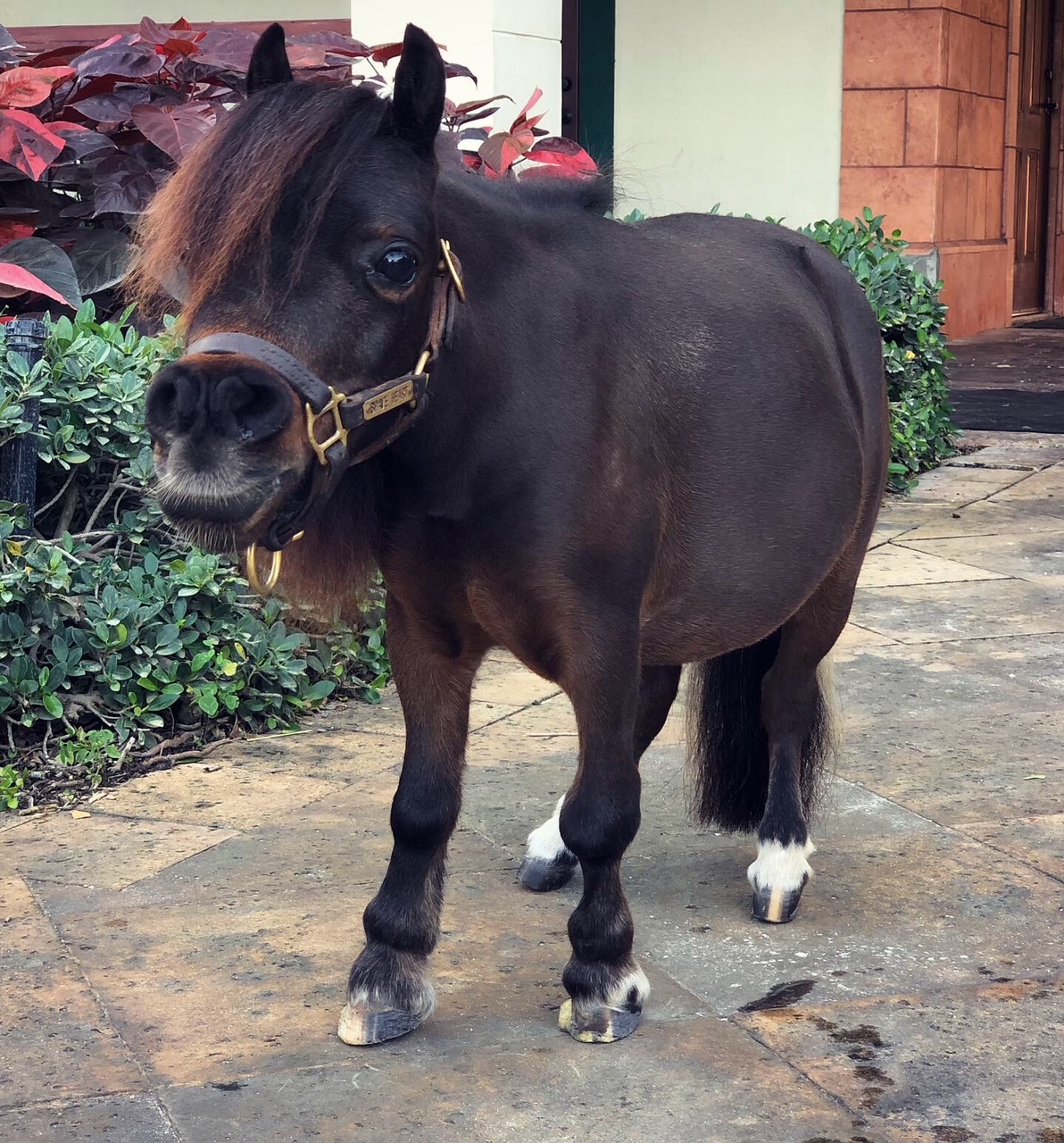
Because dwarf minis almost always have an underbite, dental care is important to help them chew properly and avoid painful conditions from malformed teeth.
“My glue bill for dwarf shoes is $10,000 a year and my dental bill is close to $10,000, so these expenses are immense,” says Josh.
Of course, if a dwarf mini comes to the farm because their owner is unable to address the animal’s special needs, The Peeps Foundation serves as a sanctuary offering a home for life. Peeps herself, who turned 11 this year, can tell you just how good that life is.
Josh loves helping minis, and he’s also happy to give hope and guidance to the people who love these tiny equines and want to care for them properly.
“Some competitors make yearly donations, and we appreciate donations, but most of our survival is as a self-funded nonprofit.”
Making it work
“It’s really a group effort; if it wasn’t for everybody, it wouldn’t be possible,” says Josh, adding, “My husband, Tom Guzowski, is a huge part of making everything Peeps happen.”
The horse industry is a tight-knit group and eager to help those making a difference.
“Some competitors make yearly donations, and we appreciate donations, but most of our survival is as a self-funded nonprofit,” says Josh.
In that Kentucky field 11 years ago, he had no idea that rescuing a pint-sized foal and her buddies would evolve into a well-respected nonprofit helping countless humans and equines. But he’d do it all over again in a heartbeat.
If you would like to read other equestrian related posts please be sure to check out some of our previous features.
Horse Farms Forever Conservation Summit 2025
For Central Florida, protection and conservation...
Belmont 2025 | Local Contenders
The Belmont Stakes is the final showdown of the...
Preakness 2025 | Local Contenders
The field is shaping up for the May 17 Preakness...
Kentucky Derby 2025 | Marion County Connections
If you hang around long enough with horse...
Pint-size Companions Deliver Full-Sized Fun
Photo Courtesy of Stacy Furgang, DMVPint-size...
Community Spotlight | Law Enforcement on Hooves
Law Enforcement on Hooves: Mounted Units at Home...
